How Each Personality Type Supports People in Pain
Have you ever wondered how you could help someone in a time of distress? Do you ever consider what unique gifts you can bring to the table to support your friends and loved ones? Today I want to look at some of the ways that each of the Myers-Briggs® personality types reaches out to others and lends a helping hand during times of crisis and pain. Hopefully reading this will inspire you to make the most of your gifts and reach out to others in ways that will improve the world!
Why is this important?
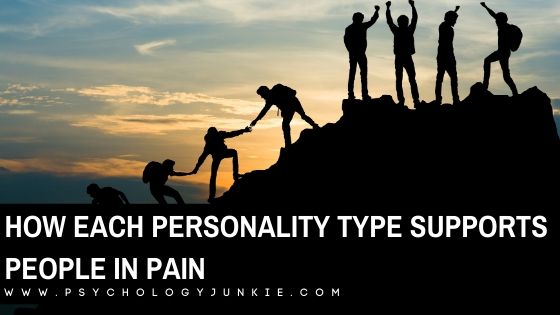
Many times when we’re struggling or in pain we want people to respond to us in our style. If you’re an intuitive-feeling type, you want people to respond to you with intuition and feeling in most cases. But if someone is trying to help you through sensing and thinking means, you might misunderstand or take it the wrong way. That’s why understanding the ways that each person supports others is crucial.
Let’s get started!
Not sure what your personality type is? Take our new personality questionnaire here. Or you can take the official MBTI® here.
Table of contents
- The ENFP – “I will hold space for you and defend you”
- The ENTP – “I will create opportunities and ideas for you”
- The INFP – “I will be with you in your darkness”
- The INTP – “I will troubleshoot for you”
- The ENFJ – “I will make your voice heard”
- The ENTJ – “I will devise a team so that your goals can be realized”
- The INFJ – “I will map out a pathway to healing”
- The INTJ – “I will give you the strategic advantage”
- The ESFP – “I will show you the beauty that still exists”
- The ESTP – “I’ll take charge of the chaos for you”
- The ISFP – “I won’t look away from your pain”
- The ISTP – “I’ll get you immediate results and assistance”
- The ESFJ – “I’ll gather a community of support for you”
- The ESTJ – “I will make sure everything is under control for you”
- The ISFJ – “I will protect you from harm”
- The ISTJ – “I’ll take care of the important details for you”
Estimated reading time: 11 minutes
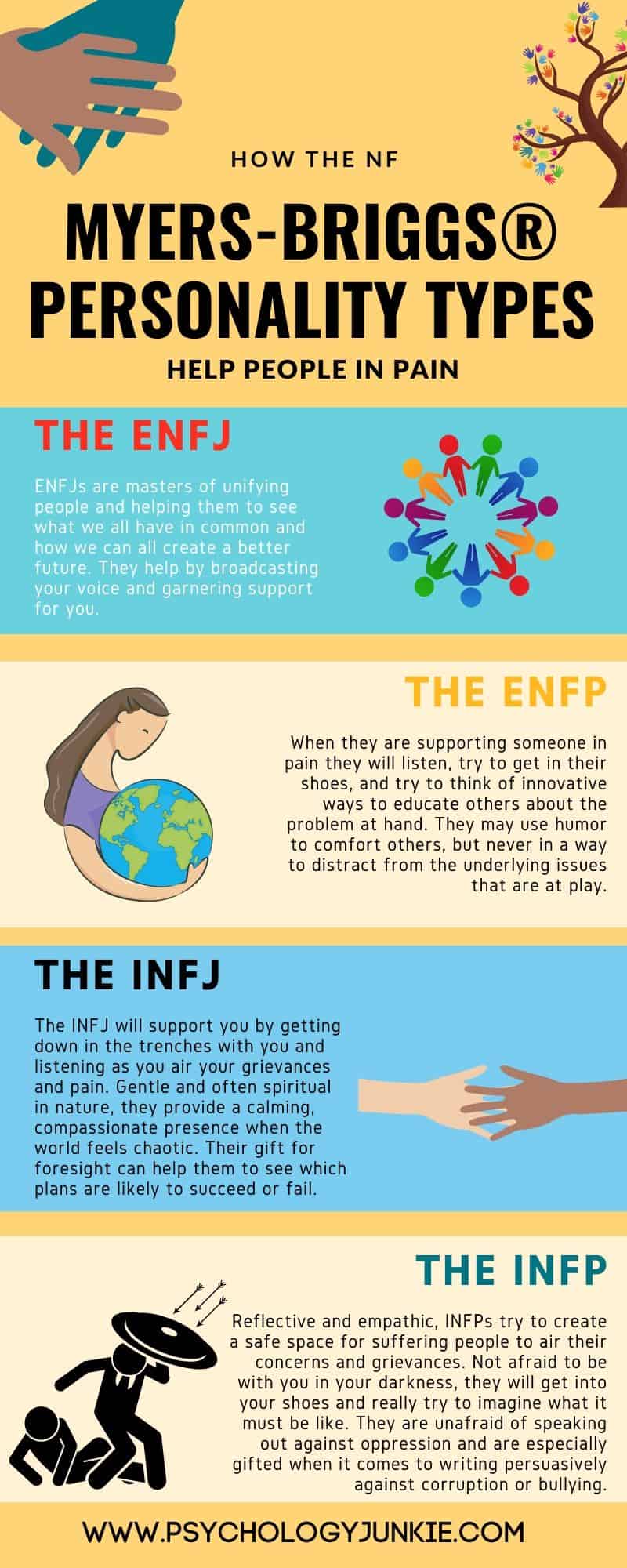
The ENFP – “I will hold space for you and defend you”
ENFPs are famously non-judgmental and inspiring. They detest corruption and bullying and will go to great lengths to spread awareness and defend marginalized people. When they are supporting someone in pain they will listen, try to get in their shoes, and try to think of innovative ways to educate others about the problem at hand. They may use humor to comfort others, but never in a way to distract from the underlying issues that are at play. ENFPs know that everyone’s individual experience is unique and they will fight to ensure that you are given a safe space to voice their struggles and anguish.
The ENTP – “I will create opportunities and ideas for you”
ENTPs are overflowing with imagination, and it doesn’t disappear when struggles arise. When they support someone they look for innovative solutions to the problem at hand. They can often present ideas and pathways that the person suffering didn’t even think were possible before. On top of that, they use their natural charm and humor to lighten up the situation, create open lines of communication, and comfort those who feel surrounded in darkness and despair.
The INFP – “I will be with you in your darkness”
INFPs are deeply committed to their loved ones or to people they feel have been oppressed. Reflective and empathic, they try to create a safe space for suffering people to air their concerns and grievances. Not afraid to delve into the trenches, INFPs will get into the shoes of someone who is suffering and really try to imagine what it must be like. They are unafraid of speaking out against oppression and are especially gifted when it comes to writing persuasively. Their careful, creative nature and their deeply-held values come through beautifully when they have time to mull over their words and craft them effectively.
The INTP – “I will troubleshoot for you”
INTPs have a gift for creating opportunities out of less-than-attractive situations. Their ability to anticipate logical consequences and understand the inner workings of the world around them gives them a leg up in desperate situations. In crisis situations, INTPs are able to create unconventional solutions and take risks that others would be too afraid to try. They will challenge the status quo by innovating, anticipating, and seeing possibilities that don’t exist at the present moment. They’ll also speak truth to suffering people, out of respect for their humanity. Their bedside manner may not be the best, but you can count on them to be honest in a calm and patient way.
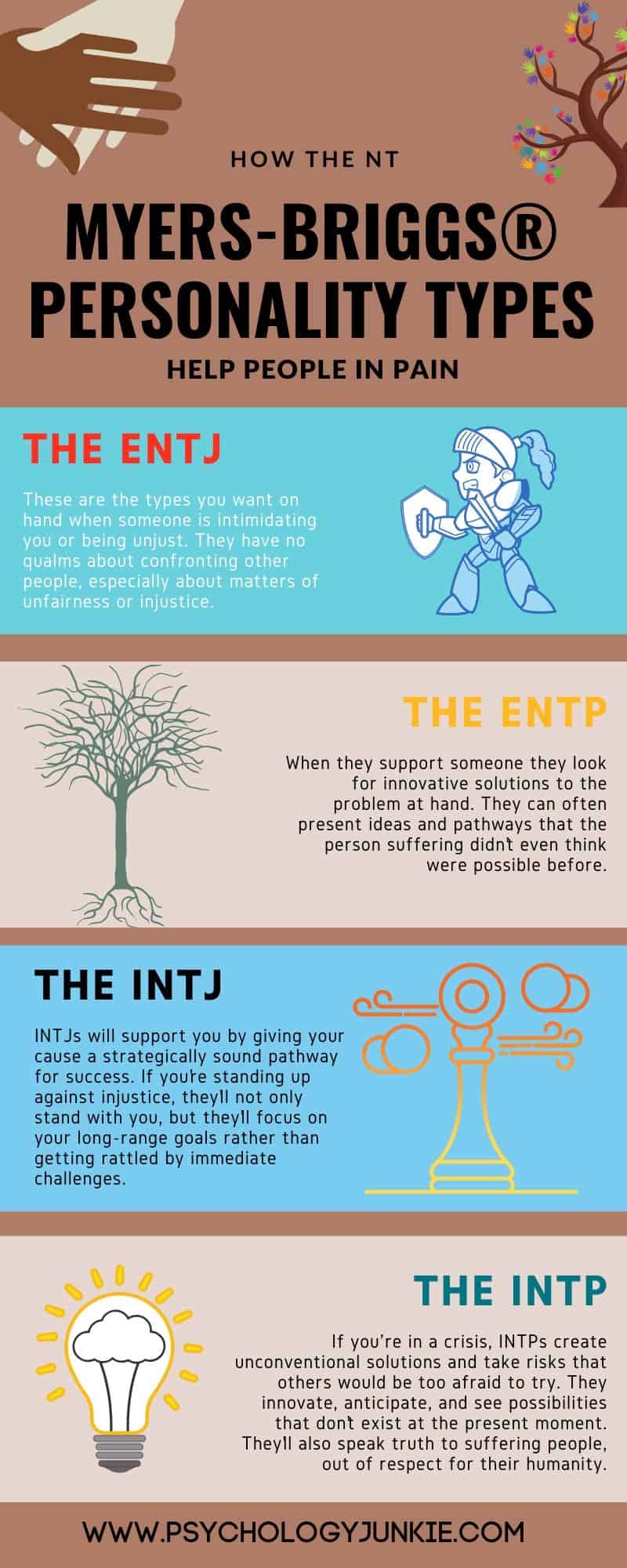
The ENFJ – “I will make your voice heard”
Visionary and empathic, ENFJs will make sure that your specific needs are broadcast to the right people. If you’re sick or in physical pain, they’ll be your spokesperson – ensuring that you get the proper care, meals, and comforts that you crave. If you’re experiencing oppression, they’ll stand with you as you protest, call representatives, speak out on their social media platforms, and rally others to your cause. ENFJs are masters of unifying people and helping them to see what we all have in common and how we can all create a better future.
The ENTJ – “I will devise a team so that your goals can be realized”
ENTJs are typically smart, fearless, and commanding. These are the types you want on hand when someone is intimidating you or being unjust. They have no qualms about confronting other people, especially about matters of unfairness or injustice. Visionary and strategic, they’re less focused on bedside manner and more focused on getting your goals met in the fastest possible way. Rather than seeing roadblocks, they approach obstacles as exciting challenges. And if there’s a conflict with other people along the way, they’ll be more than happy to face it. If these types care about you, they’ll enthusiastically fight against what’s oppressing you – whether it be illness, injustice, or inefficiency. They’ll network extensively, and direct a team to get things done logically and quickly.
The INFJ – “I will map out a pathway to healing”
Uncannily empathic, the INFJ will support you by getting down in the trenches with you and listening as you air your grievances and pain. Gentle and often spiritual in nature, they provide a calming, compassionate presence when the world feels chaotic. Their gift for foresight can help them to see which plans are likely to succeed or fail. Are you trying to stand up against injustice? Get through another day of chemotherapy? Grapple with depression? An emotionally healthy INFJ help to iron out your goals, calm emotional tensions, and inspire you to maintain strength and courage.
The INTJ – “I will give you the strategic advantage”
Intellectual and loyal, INTJs will support you by giving your cause a strategically sound pathway for success. If you’re standing up against injustice, they’ll not only stand with you, but they’ll focus on your long-range goals rather than getting rattled by immediate challenges. Calm and insightful, they will help you to see future implications, circumvent obstacles, and maintain the high ground intellectually. If you’re grappling with sickness, they’ll do whatever they can to provide practical support – even doing the nitty-gritty chores they typically hate. These types may not know how to soothe with comforting words all the time, but they’ll show their support through action and loyalty.
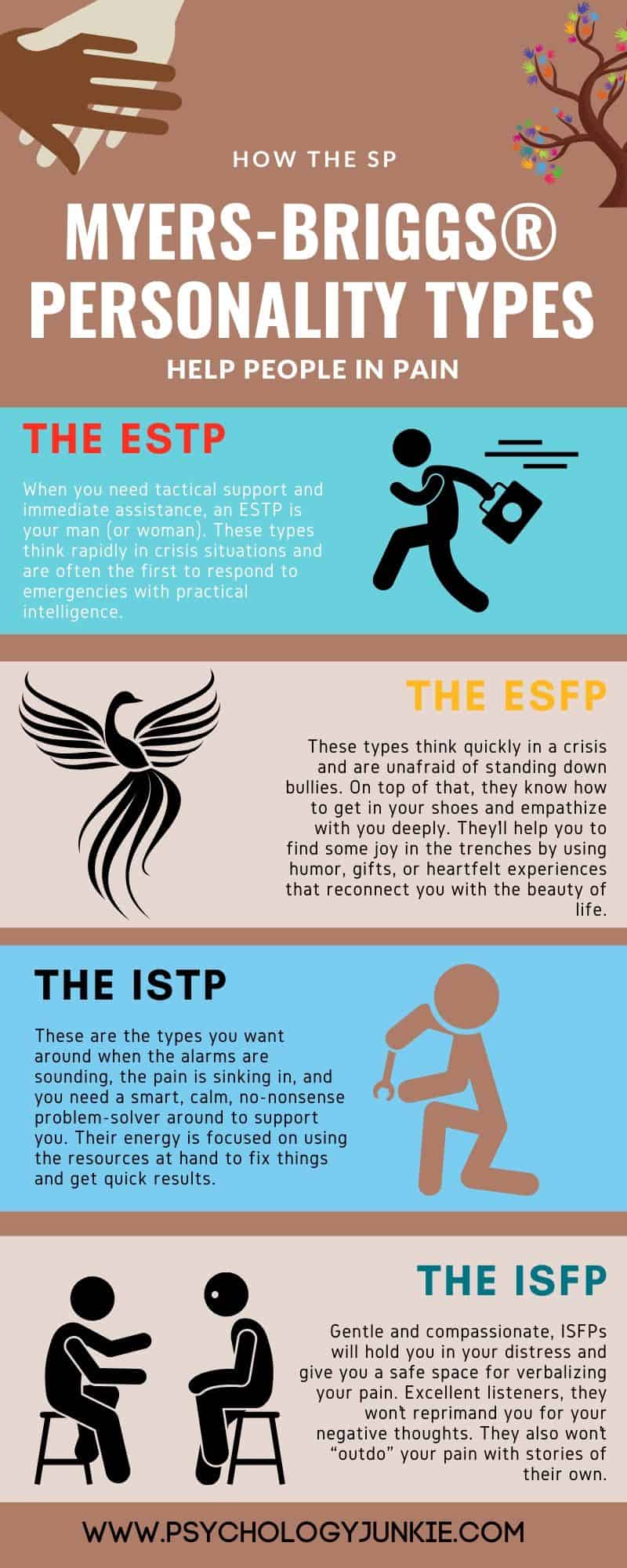
The ESFP – “I will show you the beauty that still exists”
ESFPs have no tolerance for bullying or oppression. If you’re on the receiving end of discrimination, they’ll not only stand with you, they’ll fight vigorously against your enemy. These types think quickly in a crisis and are unafraid of standing down bullies. On top of that, they know how to get in your shoes and empathize with you deeply. They’ll help you to find some joy in the trenches by using humor, gifts, or heartfelt experiences that reconnect you with the beauty of life.
The ESTP – “I’ll take charge of the chaos for you”
When you need tactical support and immediate assistance, an ESTP is your man (or woman). These types think rapidly in crisis situations and are often the first to respond to emergencies with practical intelligence. Their resourceful, logical nature helps them to see solutions in situations that others would be blind to. Need first aid? Chances are, they’ve taken some kind of course on it. Dealing with a bully? These types welcome the opportunity to face them down. And the best part is that they do all this with a commanding yet friendly presence. They’ll put you at ease and use humor to deflate pent-up emotions.
The ISFP – “I won’t look away from your pain”
Gentle and compassionate, ISFPs will hold you in your distress and give you a safe space for verbalizing your pain. Excellent listeners, they won’t reprimand you for your negative thoughts. They also won’t “outdo” your pain with stories of their own. They’ll be with you in your experience and respect your personal needs. These types are also known for staying calm in crisis situations, not shying away from things that others would feel queasy around. Down-to-earth but empathetic, ISFPs usually have a calming yet down-to-earth bedside manner.
The ISTP – “I’ll get you immediate results and assistance”
ISTPs are skilled at analyzing a crisis situation and finding rapid solutions to get you the outcome you need. These are the types you want around when the alarms are sounding, the pain is sinking in, and you need a smart, calm, no-nonsense problem-solver around to support you. Their energy is focused on using the resources at hand to fix things and get quick results.
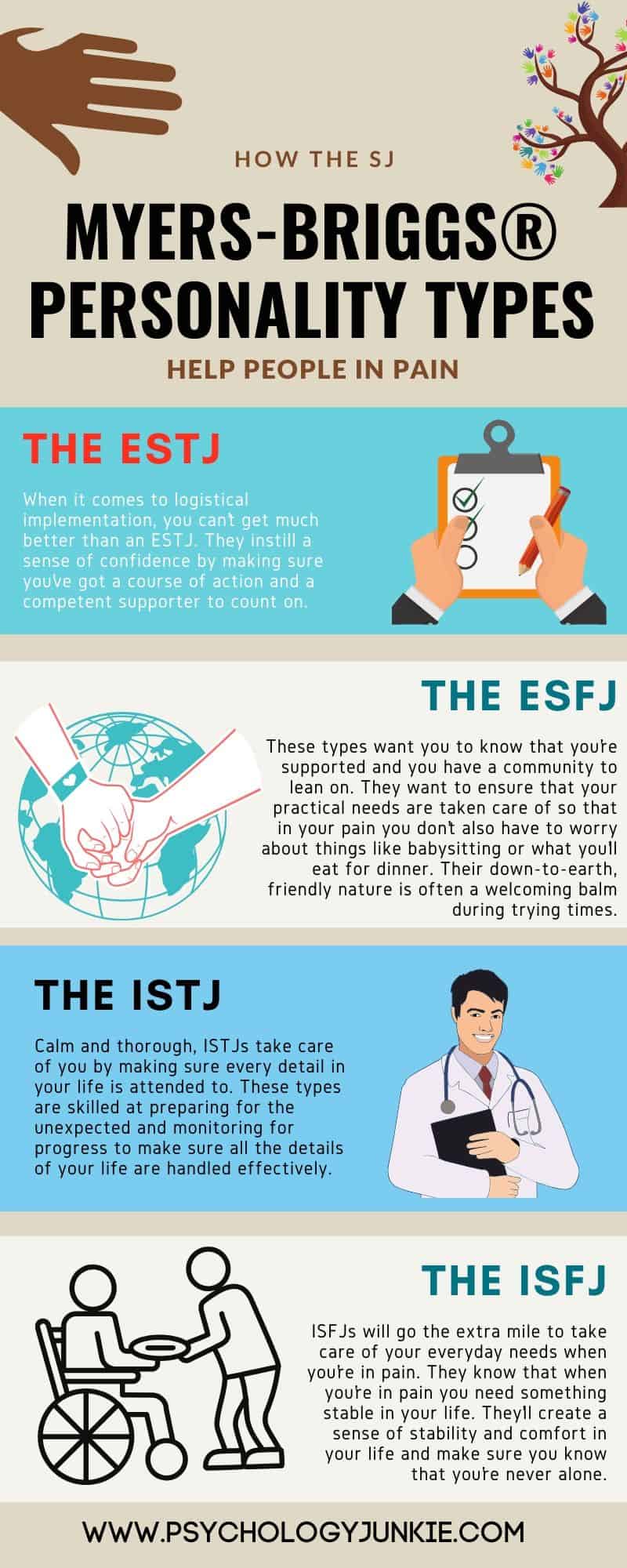
The ESFJ – “I’ll gather a community of support for you”
Practical and compassionate, the ESFJ will take a thorough assessment of your needs and make sure there’s a team of people working to help you. They’ll organize meal deliveries, clean your house, or simply hold your hand and be with you in your pain. These types want you to know that you’re supported and you have a community to lean on. They want to ensure that your practical needs are taken care of so that in your pain you don’t also have to worry about things like babysitting, dishes, or what you’ll eat for dinner. Their down-to-earth, friendly nature is often a welcoming balm during trying times.
The ESTJ – “I will make sure everything is under control for you”
When it comes to logistical implementation, you can’t get much better than an ESTJ. If you’re suffering from oppression, they’ll find the appropriate authorities and make sure your grievances are addressed in a logical, timely manner. If you’re in physical anguish, they’ll take charge of details that might overwhelm you otherwise. They’ll make sure your legs are up, doctors’ appointments are scheduled, and you’ve got an effective schedule to ensure your comfort. They instill a sense of confidence by making sure you’ve got a course of action and a competent supporter to count on.
The ISFJ – “I will protect you from harm”
While ISFJs are often praised for their nurturing, down-to-earth nature, they also have a steely side that is rarely discussed. When someone they love is hurting, they’ll go to great lengths to defend and protect them. Sometimes that means bringing a pot of hot soup to you when you’re sick. At other times this can mean literally going into battle to physically protect you from a bully. ISFJs will go the extra mile to take care of your everyday needs when you’re in pain. They know that when you’re in pain you need something stable in your life. They’ll create a sense of stability and comfort in your life and make sure you know that you’re never alone.
The ISTJ – “I’ll take care of the important details for you”
Calm and thorough, ISTJs take care of you by making sure every detail in your life is attended to. If you’re sick and suffering, they’ll manage things like making sure your bills are paid or your lawn is mowed. They’ll also help with laying out detailed plans and organizing logistically how to get your goals met in a timely manner. These types are skilled at preparing for the unexpected and monitoring for progress to make sure all the details of your life are handled effectively.
What Are Your Thoughts?
Do you agree with this article? Disagree? Let us know in the comments!
Find out more about your personality type in our eBooks, Discovering You: Unlocking the Power of Personality Type, The INFJ – Understanding the Mystic, and The INFP – Understanding the Dreamer. You can also connect with me via Facebook, Instagram, or Twitter!


Subscribe to Our Newsletter

Want to discover more about personality type? Get the inside scoop with Susan Storm on all things typological, along with special subscriber freebies, and discounts on new eBooks and courses! Join our newsletter today!


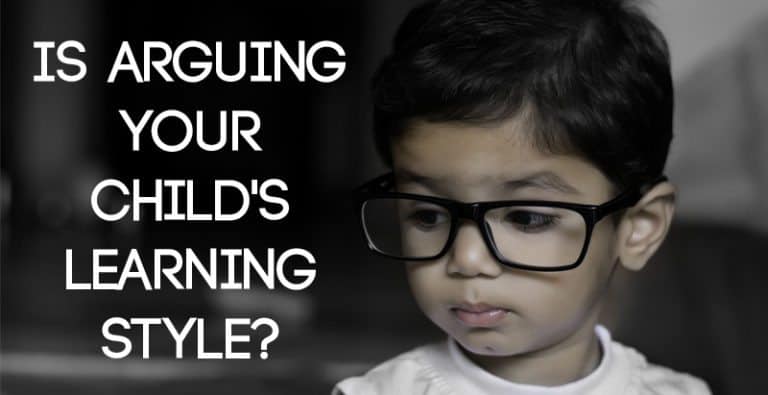
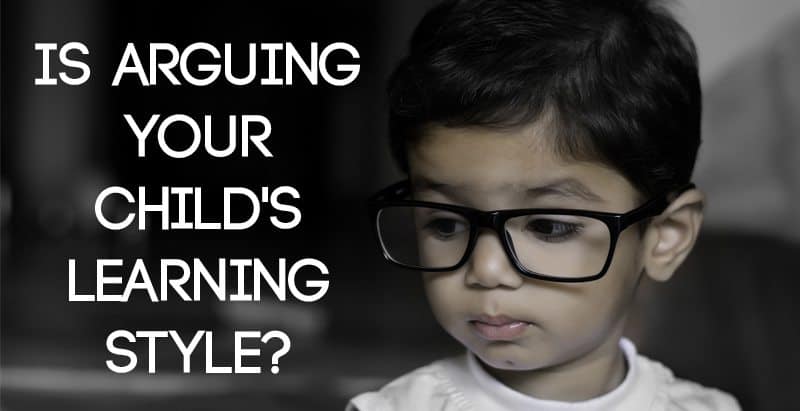
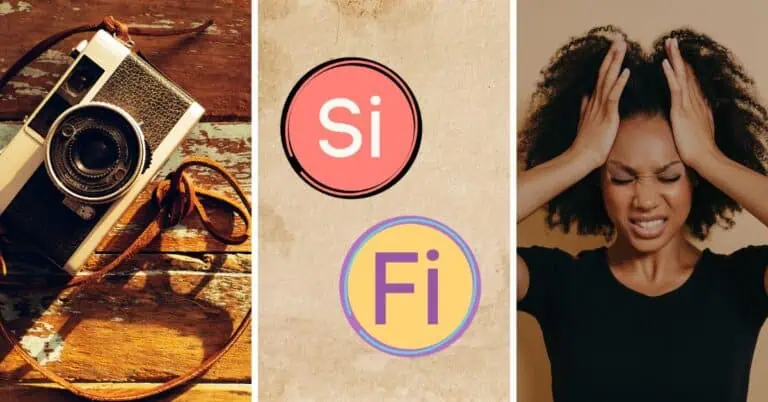




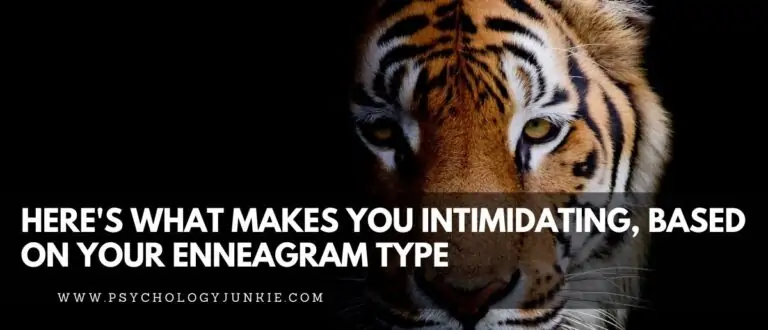
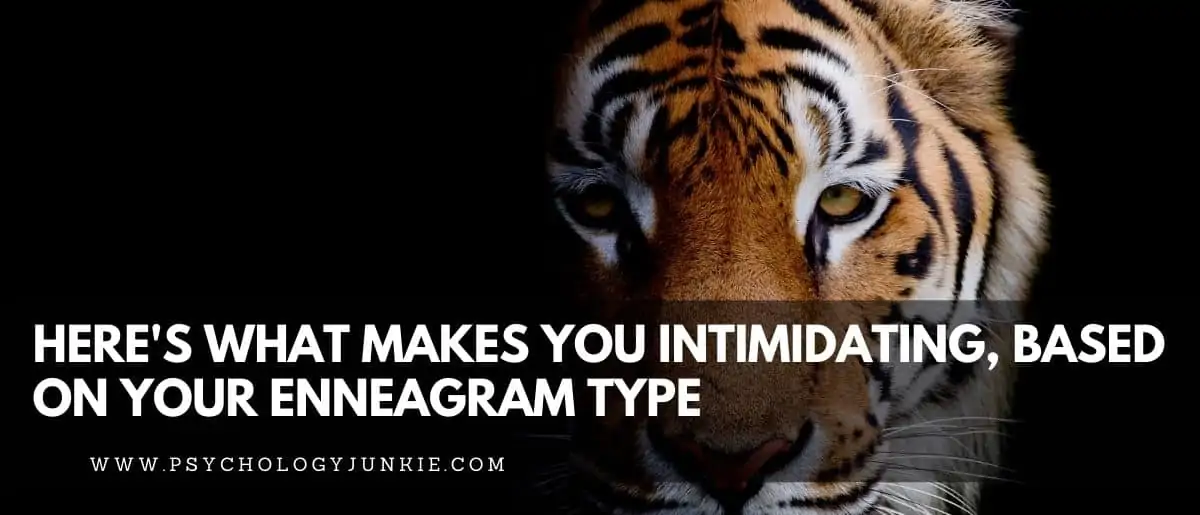


I hardest part about being an INFJ is getting this intuitive insights and feeling the behind the social mask underlying current of an ancient pain, then offering up unsolicited advice. This is after doing some uninstrusive probing questions. It feels like a boundary violation towards someone not ready to face what’s bothering them, and I tend to get a backlash, and so I back off into my turtle shell beating myself up.
Easiest part is more serendipitous, that strangers open up to me and that always seems to give them comfort and peace after we are done.
“They’ll also speak truth to suffering people, out of respect for their humanity.” .. even if you don’t want to hear it to the point you’ll stop talking to me. x) I’ll take the risk if I think it needs to be heard. #INTP
“Their bedside manner may not be the best, but you can count on them to be honest in a calm and patient way.” True, except for calm and patient. I’m also an 8. It depends on circumstances, I don’t think I’m ever patient (probably have ADHD) but I can be calm.
Recently there’s my best friend and my cousin who have been thinking it’s a good idea to not give limits to their toddlers. I know raising a kid is a personal issue, and very sensitive topic. But there’s a mental health risk, here. INTP did her research a bit. So I know I don’t have kids, but I know that’s how you can become NPD or ending up needed a psychiatrist, because the child didn’t get the security of boundaries, and didn’t learn to deal with frustration or to behave around others and not be selfish all the time. So I still told the parents.. They didn’t like it, but if I believe they’re endangering their kids somehow, I will tell. For my cousin it’s quite ironic, his sister is quite likely NPD, he and his wife can’t stand her (NPD are hard to stand, even for psychiatrists), and yet they’re doing everything needed for their kid to become NPD.